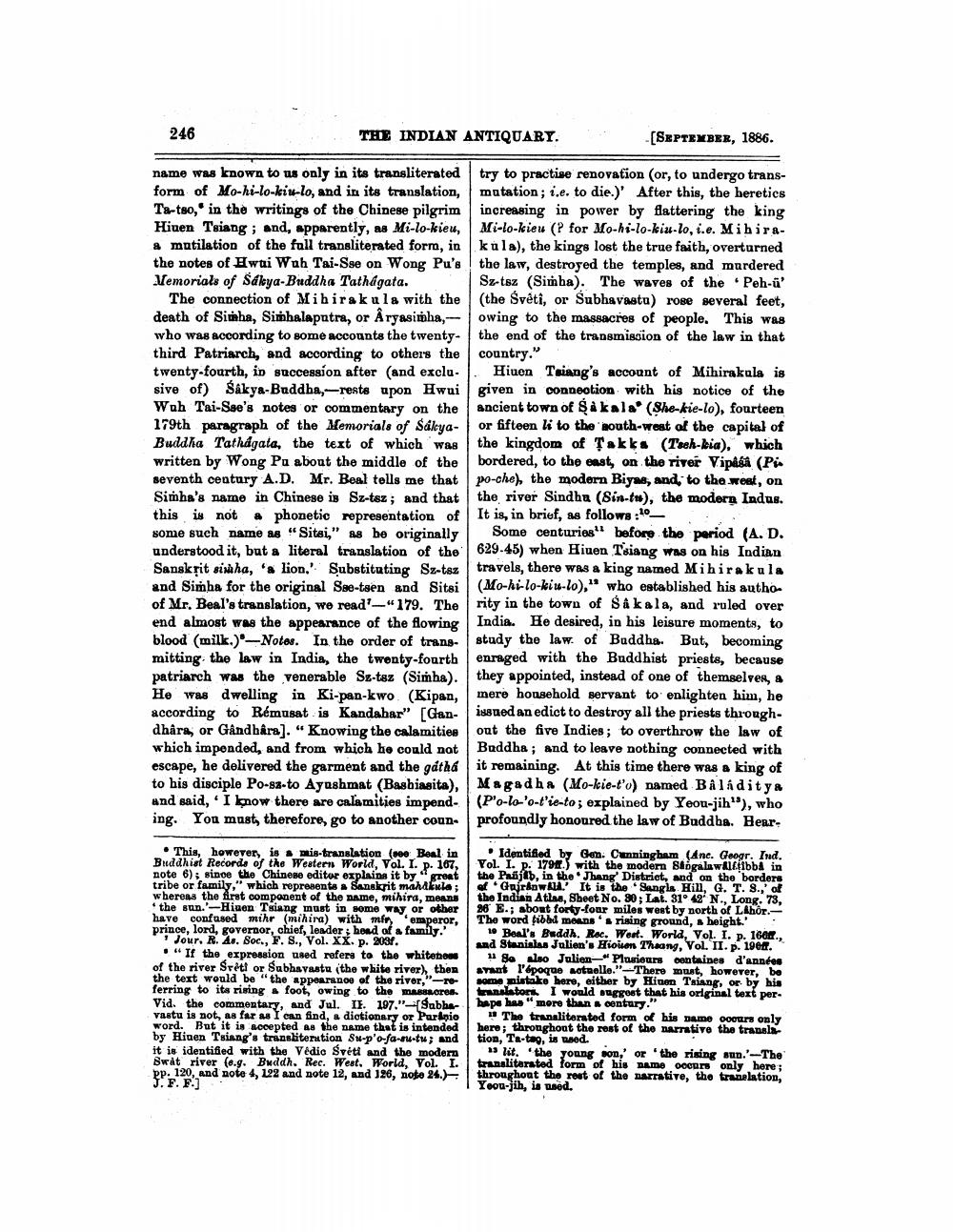________________
246
THE INDIAN ANTIQUARY.
name was known to us only in its transliterated form of Mo-hi-lo-kiu-lo, and in its translation, Ta-tso, in the writings of the Chinese pilgrim Hiuen Tsiang; and, apparently, as Mi-lo-kieu, a mutilation of the full transliterated form, in the notes of Hwai Wuh Tai-Sse on Wong Pu's Memorials of Sakya-Buddha Tathagata.
The connection of Mihirakula with the death of Simha, Simhalaputra, or Aryasimha, who was according to some accounts the twentythird Patriarch, and according to others the twenty-fourth, in succession after (and exclusive of) Sakya-Buddha,-rests upon Hwui Wah Tai-See's notes or commentary on the 179th paragraph of the Memorials of SákyaBuddha Tathagata, the text of which was written by Wong Pu about the middle of the seventh century A.D. Mr. Beal tells me that Simha's name in Chinese is Sz-tsz; and that this is not a phonetic representation of some such name as "Sitsi," as he originally understood it, but a literal translation of the Sanskrit simha, 'a lion.' Substituting Sz-tsz and Simha for the original Sse-tsen and Sitsi of Mr. Beal's translation, we read"-"179. The end almost was the appearance of the flowing blood (milk.)-Notes. In the order of transmitting the law in India, the twenty-fourth patriarch was the venerable Sz-tez (Simha). He was dwelling in Ki-pan-kwo (Kipan, according to Rémusat is Kandahar" [Gandhara, or Gândhara]. "Knowing the calamities which impended, and from which he could not escape, he delivered the garment and the gáthá to his disciple Po-sa-to Ayushmat (Bashiasita), and said, I know there are calamities impending. You must, therefore, go to another coun
This, however, is a mis-translation (see Beal in Buddhist Records of the Western World, Vol. I. P 167, note 6); since the Chinese editor explains it by great tribe or family," which represents a Sanskrit mahakula; whereas the first component of the name, mihira, means the sun.-Hiuen Tsiang must in some way, or other have confused mihr (mihira) with mir, emperor, prince, lord, governor, chief, leader; head of a family. Jour. R. As. Soc., F. S., Vol. XX. p. 203f.
"If the expression used refers to the whiteness of the river Sveti or Subhavastu (the white river), then the text would be "the appearance of the river," ferring to its rising a foot, owing to the massacres. Vid. the commentary, and Jul. II. 197." Sabha vastu is not, as far as I can find, a dictionary or Parigio word. But it is accepted as the name that is intended by Hiuen Tsiang's transliteration Su-p'o-fa-su-tu; and it is identified with the Vêdic Svéti and the modern Swat river (e.g. Buddh. Rec. West. World, Vol. I. pp. 120, and note 4, 122 and note 12, and 126, note 24.)J. F. F.]
[SEPTEMBER, 1886.
try to practise renovation (or, to undergo transmutation; i.e. to die.)' After this, the heretics increasing in power by flattering the king Mi-lo-kieu (? for Mo-hi-lo-kiu-lo, i.e. Mihirakula), the kings lost the true faith, overturned the law, destroyed the temples, and murdered Sz-tsz (Simba). The waves of the Peh-ü' (the Svêti, or Subhavastu) rose several feet, owing to the massacres of people. This was the end of the transmission of the law in that country."
Hiuen Taiang's account of Mihirakula is given in connection with his notice of the ancient town of Sakala" (She-kie-lo), fourteen or fifteen li to the south-west of the capital of the kingdom of Takka (Tseh-kia), which bordered, to the east, on the river Vipasa (Pi po-che), the modern Biyas, and, to the west, on the river Sindha (Sin-tu), the modern Indus. It is, in brief, as follows:10
Some centuries" before the period (A. D. 629-45) when Hiuen Tsiang was on his Indian travels, there was a king named Mihirakula (Mo-hi-lo-kiu-lo), who established his authority in the town of Sakala, and ruled over India. He desired, in his leisure moments, to study the law of Buddha. But, becoming enraged with the Buddhist priests, because they appointed, instead of one of themselves, a mere household servant to enlighten him, he issued an edict to destroy all the priests throughout the five Indies; to overthrow the law of Buddha; and to leave nothing connected with it remaining. At this time there was a king of Magadha (Mo-kie-t'o) named Baladitya (P'o-lo-'o-t'ie-to; explained by Yeou-jih"), who profoundly honoured the law of Buddha. Hear
Identified by Gen. Cunningham (Anc. Geogr. Ind. Vol. I. p. 179 with the modern Sangalawalfiibba in the Panjab, in the Jhang' District, and on the borders af Gujranwala.' It is the Sangla Hill, G. T. S.,' of the Indian Atlas, Sheet No. 30; Lat. 31° 42' N., Long. 73, 26 E.; about forty-four miles west by north of Lahor.The word tibbd means a rising ground, a height.'
10 Beal's Buddh. Rec. West. World, Vol. I. p. 160m., and Stanislas Julien's Hiouen Theang, Vol. II. p. 190.
11 So also Julien-" Plusieurs centaines d'années avant l'époque actuelle."-There must, however, be some mistake here, either by Hinen Tsiang, or by his translators. I would suggest that his original text perhape has "more than a century."
The transliterated form of his name occurs only here; throughout the rest of the narrative the transla tion, Ta-tag, is used.
13 lit. the young son, or the rising sun.'-The transliterated form of his name occurs only here; throughout the rest of the narrative, the translation, Yeou-jih, is used.




